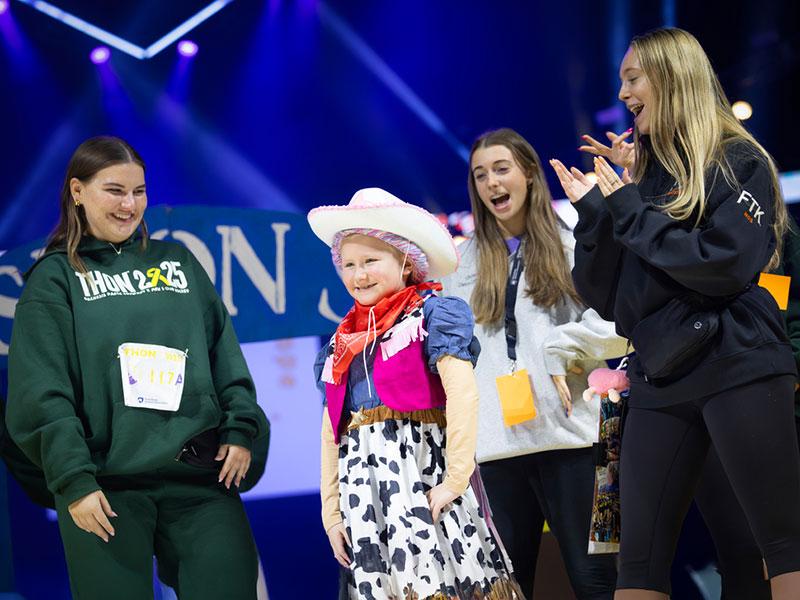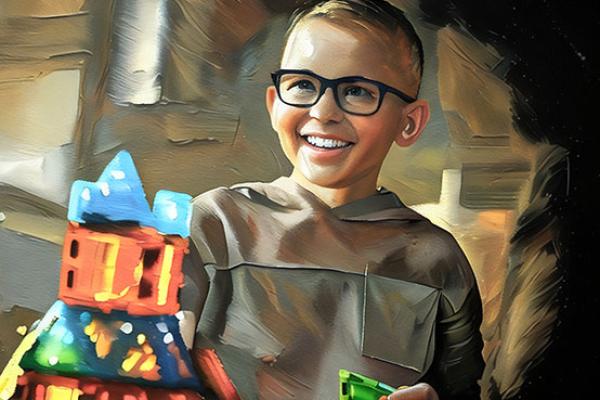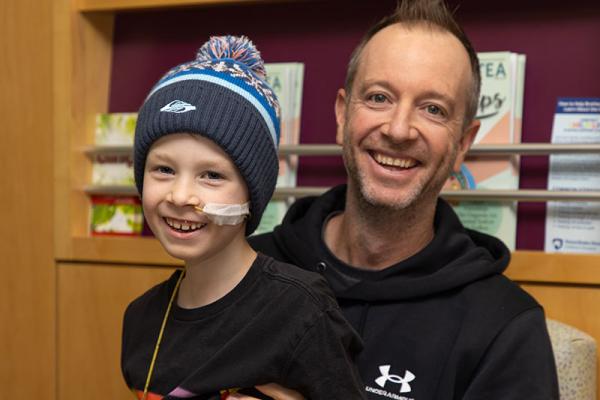
Penelope’s story: Courage, care and a community behind her
Story by Jean Waverka
Looking back on a June 2024 family outing to the pool, Rob and Corinne Ciancaglini knew something wasn’t right. Their six-year-old daughter Penelope, usually full of energy, wasn’t swimming or playing with friends. Instead, she just wanted to lay quietly on the warm pavement and soak up the sunshine.
Rob, a pediatric critical care physician with Penn State Health Milton S. Hershey Medical Center, couldn’t shake his concern. Penelope had been losing weight and dealing with stomachaches, fevers and now sudden fatigue.
“I told my wife, ‘We need to get labs drawn to make sure it isn’t leukemia,’” he said. “Lo and behold, it was.”
Facing the diagnosis
The news was devastating. But Rob also knew that, when caught early, leukemia in children is often very treatable with good outcomes. As the family prepared for Penelope’s first month of therapy, he found comfort knowing her oncologist, Dr. Daniel McKeone, was a trusted friend and his former chief resident.
“I remember him saying, “This month is going to be tough, but at the end, you’re going to have your daughter back.”
A grueling first month
The first month brought heavy chemotherapy and high-dose steroids, along with difficult side effects.
“She had insomnia. She was so hungry all the time, waking up at 3 a.m. asking for chicken wings and crying because the store wasn’t open yet,” Rob said. “Other times, she had muscle weakness. There were days and weeks that we had to carry her up the stairs.”
Despite the challenges, the treatment worked. A follow-up biopsy taken at the end of the month confirmed that Penelope was in remission with no detectable cancer in her body.
The long road to healing
But remission wasn’t the end of the journey.
“They know because of decades of experience, that if you stop treatment at that point, that cancer cells might still be around and proliferate,” Rob explained. “The goal is to kill off any remaining cells. It takes another two years or so to do that.”
For the next five months, Penelope underwent a rotating schedule of IV and oral chemotherapy.
Each month brought new challenges.
Support beyond medicine
Throughout this time, the family received crucial help from Four Diamonds, which supports patients treated at Penn State Health Children’s Hospital and their families through superior care, comprehensive support and innovative research.
“They help you navigate something that, at times, feels like an impossible situation,” Rob said.
“They’ve paid for therapy sessions, wigs – not just the medical care but the things that help her get through the day. Being able to support those types of emotional needs is important and really helped.”
A fresh start
In January 2025, Penelope transitioned to long-term maintenance therapy that will continue until August 2026. She had missed the fall semester of school but was eager to return in the new year. She also wanted her classmates to know why her hair was so short and why she had been away.
“She wanted it to be an open dialogue about cancer, so I went in and did some education. The kids asked great questions,” Rob said. “They accepted her immediately. She’s done great.”
Thriving again
Penelope soon returned to dance lessons, walked the runway during a THON™ fashion show and later rejoined the swim team. In doing so, her dad says she’s gained the confidence she never had before.
“To see her come from losing her hair, to where it’s regrown and she’s now winning swim races, it’s just an incredible journey and a testament to how tough she is,” Rob said. “She’s doing unbelievably well. Dr. McKeone was right. We got our daughter back.”





